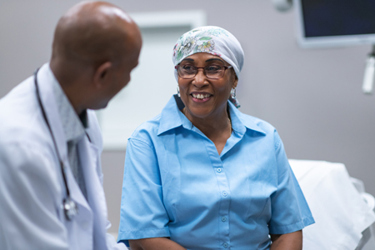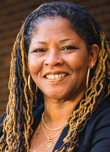Addressing Underrepresentation In Cancer Trials: A Q&A With Stand Up To Cancer & Triage Cancer
A conversation with Stand Up To Cancer researcher Chanita Hughes-Halbert, Ph.D., and grant recipient Triage Cancer co-founder and COO Monica Fawzy Bryant, Esq.

Underrepresentation of underserved patient populations is an all-too-common occurrence in clinical trials. It’s increasingly become a topic of conversation — and a call to action.
Stand Up To Cancer (SU2C) has awarded several teams of researchers and community organizations with grants to study and improve diversity in cancer clinical trials within certain geographic areas. As a part of this effort, seven urban community groups in four cities across the country were awarded grants this past fall, including Triage Cancer in Los Angeles. These recipient organizations that aid underserved communities are working with four SU2C research teams seeking new ways to engage underserved populations in Phase 1 and 2 cancer clinical trials. The research teams are supported by a sponsorship from the Janssen Pharmaceutical Companies of Johnson & Johnson as a part of the SU2C Diversity In Early Development Clinical Trials Program. This collaboration aims to increase cancer clinical trial awareness and education within the teams’ focus regions.
Clinical Leader heard from both sides of the collaboration — SU2C researcher Dr. Chanita Hughes-Halbert, Ph.D., and grant recipient Triage Cancer co-founder and COO Monica Fawzy Bryant, Esq. — to explore each’s efforts to together bring health equity to those diagnosed with cancer.
Identifying And Empowering Communities Of Need With SU2C
New FDA directives and a concurrent cultural shift in clinical research have meant a more acute focus on reaching and enrolling “underserved communities” in clinical trials. Who is considered part of an “underserved community,” and does that definition ever change?

Chanita Hughes-Halbert: Historically, communities of diverse races and ethnicities, as well as people living in rural communities, are frequently underserved by the healthcare system. Social determinants of health — such as lack of insurance, being underinsured, having limited education or transportation, level of employment, and ability to take time off — impact access to healthcare in the United States. The conditions in which people live, work, learn, and play, as well as mistrust or fear of the healthcare system or language and financial barriers, all contribute to health disparities and impact cancer outcomes as well.
SU2C’s community engagement grant aims to increase diversity in early-phase clinical trials for cancer. What do we know about cancer’s prevalence in and outcomes on racially and ethnically diverse populations?
Hughes-Halbert: According to the American Cancer Society, Black Americans have the highest death rate and shortest survival of any racial/ethnic group in the United States for most cancers, and Black men also have the highest cancer incidence rate. Additionally, Hispanic people and American Indian and Alaska Native people are more likely to get certain types of cancer, including liver and stomach cancers. Screening rates for certain cancers, such as colorectal cancer, are also lower in Black, Hispanic, and American Indian/Alaska Native people.
In the United States, cancer clinical trial participation remains significantly lower for people of diverse races and ethnicities and people in medically underserved communities. According to 2020 data from the FDA, 73% of cancer clinical trial participants are white, 14% are Asian, 6% are Hispanic, and 5% are Black. Lack of diversity in clinical trial participation raises the possibility that study results may not fully apply to every patient.
Knowing certain groups arrive at a cancer diagnosis at a disadvantage, in terms of access to care, including clinical trials, what are some ways in which community engagement can lessen that hardship and improve outcomes?
The reasons for lack of cancer clinical trial participation are myriad, but language and cultural barriers, lack of access to clinical trials, fear, and delays in seeking healthcare are significant deterrents, as are concerns about financial impact — including costs of treatment and ancillary costs such as travel and time off work.
Trusted organizations that are already embedded in their communities can help disseminate clinical trial information and encourage clinical trial participation through preexisting channels. The community organizations awarded grants by SU2C are already doing incredible work in the areas of patient navigation, nutritional and mental health services, children’s programs, as well as transportation, financial, and legal assistance, which will benefit the SU2C Diversity In Early Development Clinical Trials Program and the research teams’ work.
All of the community engagement grant recipients are in four major metropolitan areas — Chicago, Dallas, Philadelphia, and Los Angeles. What makes these cities, demographically or otherwise, ideal locations for community engagement funding?
One significant barrier to diverse clinical trial participation is location. People tend to seek cancer care close to where they live; in fact, 80 percent of cancer patients are treated in the community setting, including safety-net hospitals, not at large academic medical institutions. Therefore, building awareness and clinical trial participation in the community care setting is critical to increasing trial diversity.
Chicago, Dallas, Los Angeles, and Philadelphia are the four major metropolitan areas where the SU2C Diversity In Early Development Clinical Trials Program is operating; these cities include underserved urban communities that typically access medical care through safety-net hospitals and are underserved by social and medical services. Funding community engagement grants in these areas will help researchers connect with key patient groups in a unique and genuine way.
These grantees were chosen based on a number of factors, including: novelty of the program approach; degree to which the program can lead to a model that can be applied more broadly in community cancer care; degree to which the program has a potential positive impact on cancer treatment in underserved patient populations; leadership qualities — such as willingness to collaborate and rally a team toward success with an emphasis on implementation; demographics of the organization’s leadership; a track record of collaboration and impact between academic and community partners; how this project will maximize learnings to be implemented by other organizations in the long term; and involvement of patient advocates and/or community members in the programs’ design and execution.
Educating And Uplifting Patients With Triage Cancer
Clinical Leader: Triage Cancer has 12 years’ experience helping people with cancer navigate its legal and practical impacts. How did you first identify the need for this type of service in your community?

Triage Cancer co-founder and COO Monica Fawzy Bryant, Esq.: Triage Cancer was founded in 2012 to address the glaring need for clear, reliable information and resources among individuals diagnosed with cancer, caregivers, and healthcare professionals. We know that many of the contributing factors to financial toxicity have solutions rooted in the law. However, we recognized a gap in free information on these topics for people diagnosed with cancer and their caregivers. For example, even if someone has access to clinical navigation services, it is unlikely they are provided with in-depth guidance on employment, disability insurance, or even health insurance options. We saw an opportunity to partner with others and fill a gap.
As the nonprofit has grown over the last decade-plus, when did supporting patient enrollment in clinical trials become a priority? And what services do you offer in that regard?
Bryant: Given that clinical trials are the way we get new treatments for cancer, ensuring that people understand what they are, how to access them, and how to pay for associated costs always has been a priority of ours. Triage Cancer’s purpose is to ensure those diagnosed with cancer and their caregivers have access to the resources needed to make the best decisions for them, including participating in a clinical trial.
To achieve that mission, we provide information about accessing clinical trials and how to pay for some of the practical costs of participating in a clinical trial, such as tests or doctor visits that the clinical trial doesn’t cover, potential increased costs for transportation or parking, childcare, lost income that may come from employment changes, etc. We also share useful tips about understanding your employment rights and options for taking time off work, if those are issues that may come into play for someone in a clinical trial. We provide that education across a number of platforms, including educational events, materials, resources, as well as with one-on-one assistance.
When you work with patients diagnosed with cancer, what is their overall attitude toward clinical trials? And how does that perception evolve with your guidance and support?
Bryant: When we provide education, we are helping to dispel some of the common myths (i.e., confusion about whether or not someone would receive a placebo rather than the cancer treatment; clinical trials as a treatment of “last resort”) and making sure that patients are comfortable talking to their healthcare team about all of their treatment options, including trials. We also want to make sure that people have relevant information about the practical aspects of participating in a clinical trial, such as costs, insurance coverage, and how to balance work and treatment in the trial.
What do you find is the most common hesitation or roadblock when it comes to a patient enrolling in a clinical trial?
Bryant: The biggest barrier is that their healthcare provider isn’t offering them a trial.
However, we are generally talking with people who are interested in participating but may be facing barriers to doing so. Certainly, trying to figure out health insurance coverage can be challenging. But other costs may be less obvious. Will participating in a clinical trial require individuals to take time off work, making it challenging to pay for basic daily living expenses such as food, rent, mortgage, utilities, and car payments? Will someone need to travel to participate or need increased childcare, both of which will impact finances? Additionally, the physical impact of treatment may make daily tasks challenging and require an individual to pay for help with tasks such as meal preparation and household chores. Individuals may also need to hire professional services related to employment, legal assistance, and finances.
What are some of the most fruitful ways to discuss clinical research and impart its importance to patients with cancer?
Bryant: Education about clinical trials can help patients and caregivers make the best decision for them. Virtually every other therapy currently on the market was studied and made possible by people participating in clinical trials. However, very few adult cancer patients join a trial, and many cancer clinical trials don’t get completed because not enough people participate. Without enough patient data, a promising treatment might never get approved.
Clinical trials offer a source of hope. And it’s important that trials include people from all ethnicities, backgrounds, and walks of life so researchers can see how different people respond to a study treatment.
What issues or challenges — financial, legal, or otherwise — should patients be aware of before enrolling in a clinical trial?
Bryant: We often have to remind people to talk with their healthcare team and insurance company to find out what insurance coverage they have for participating in a clinical trial and what out-of-pocket costs they might expect to pay. The Patient Protection & Affordable Care Act (ACA) requires most private insurance companies to cover the routine costs of the participant’s healthcare when they participate in a clinical trial (e.g., office visits, blood tests, and imaging scans that they would receive if you were getting the standard of care). However, insurance companies are not required to cover the research costs that are specific to the clinical trial, such as extra blood tests or imagining scans. However, most clinical trials will cover those costs. Insurance companies are also not required to cover care provided by doctors or hospitals that are outside the insurance company’s network if the plan does not normally cover out-of-network providers.
Additionally, under the Clinical Treatment Act, Medicaid cannot deny coverage of routine costs just because the clinical trial is out-of-state or because the healthcare provider is not in a patient’s Medicaid managed care plan’s network.
However, just because there are rules and protections doesn't mean that patients don't face roadblocks. We are frequently seeing patients having to appeal denials or take other actions to enforce the law and access clinical trials.
And during enrollment, who can a patient turn to with questions or concerns?
Bryant: Triage Cancer has a number of resources in English and Spanish to help people navigate clinical trial participation, including a Clinical Trial Resource Hub. If people still have questions, they can receive one-on-one assistance through our Legal & Financial Navigation Program, staffed by cancer rights attorneys.
Of course, there are also other great resources available. For example, the SU2C website has a number of resources to help with navigating the clinical trial process, such as questions to ask your healthcare provider when considering a clinical trial; suggestions for support services (financial, transportation, lodging, and other needs); and a glossary of unfamiliar clinical trial terms patients might hear, which can be a helpful first step.
Lastly, given the SU2C award, what is Triage Cancer’s plan for the funds?
Bryant: Through the generous award from SU2C, Triage Cancer plans to roll out a three-part project in Southern California, ultimately aimed at supporting individuals in medically underserved communities by providing answers to legal, financial, and practical questions that can impact access to equitable, high‐quality care, the potential financial burden of a cancer diagnosis, and participation in clinical trials.
This will be accomplished through a one-of-a-kind healthcare professional training on insurance and finances, held in conjunction with USC, a needs assessment and training of community health workers, and ongoing support for individuals participating in clinical trials, their caregivers, and healthcare professionals via the Legal & Financial Navigation Program. The overall objective is to provide information on health insurance options and navigation, employment rights, and finances that those healthcare professionals can use to support their patients and community members who are facing barriers to accessing care, including clinical trials. We want to make sure that people can access care, including by participating in clinical trials if appropriate, all while maintaining their jobs, homes, insurance, and overall quality of life.
About Stand Up To Cancer (SU2C):
Stand Up To Cancer (SU2C) raises funds to accelerate the pace of research to get new therapies to patients quickly and save lives now. Established in 2008 by media and entertainment leaders, SU2C utilizes these communities’ resources to engage the public in supporting a new collaborative model of cancer research, to increase awareness about cancer prevention, and to highlight progress being made in the fight against the disease. For more information, visit StandUpToCancer.org, Instagram, TikTok, Twitter, Facebook, YouTube, and view our Fact Sheet here.
About Triage Cancer:
Triage Cancer is a national nonprofit organization that provides free education on the legal and practical issues that may impact individuals diagnosed with cancer and their caregivers, through events, materials, and resources.
